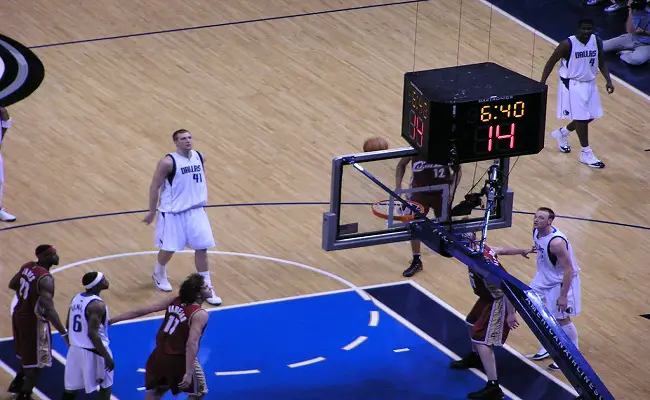When you are watching an NBA game or any basketball game, you notice that there are players who were going to the free-throw line after receiving a foul from their opponent. The first you ask yourself is why he/she is in the free-throw line even though he/she was not fouled while in a shooting motion?
The usual way for a player to be able to stand in a free-throw line is he/she should be fouled while in a shooting motion. However, that is not the only way for a player to get to the lane. A bonus, which happened in every basketball game, is the other way for a player to get into the free-throw line.
But what is the bonus? How can a bonus be attained by a team? Today, we are going to talk about the meaning of penalty or bonus in basketball. We are going to dive into the deeper meaning about penalty or bonus in basketball. If you are curious enough to know what does bonus means in basketball, then let’s get started and just continue reading!
What Does Bonus Mean In Basketball?
In basketball, the bonus situation or penalty situation occurs when one team commits a certain number of fouls in a given time. When a basketball team has committed the requisite number of fouls, each next fouls will award the opposing team a bonus free-throw regardless of the type of foul committed.
Basketball teams that are under the limit have fouls to give, and they can give fouls to their opposing team without awarding their opponents a bonus free-throw. The number of fouls resets every quarter or half depending on the rules of different basketball organizations.
The Bonus & Rules In Different Basketball Leagues
Each basketball league has different rules regarding the bonus rule. As a basketball player, you need to know them.
FIBA Rules
FIBA rules were used for all basketball competitions including the international teams, and most basketball leagues outside the US use the FIBA rules. In FIBA rules, the penalty or bonus is triggered when a team commits more than four fouls in one quarter. The next fouls or fifth foul committed will award the opposing team a bonus free-throw. In FIBA rules, only defensive fouls are awarded the bonus. Overtime periods will be considered as an extension of the fourth quarter to count team fouls that have committed.
FIBA 3×3
The FIBA 3×3 has a slightly different bonus rule. In FIBA 3×3, the penalty is triggered when a team commits more than six fouls. The subsequent fouls will award the opposing team a bonus of two free-throws. If the fouls reach ten, the tenth and subsequent fouls will award the opposing team a bonus free-throw and possession of the ball.
NBA And WNBA Rules
Penalty rules in the NBA are the same as the WNBA penalty rule. The NBA penalty rules are also similar to the FIBA penalty rules, but there are some slight differences. The only thing they are the same as is the number of team fouls committed to entering the penalty. The NBA bonus rules are triggered when a team commits more than four fouls.
The NBA includes both defensive and loose-ball fouls when counting a team’s foul limit. This rule of the NBA is a special rule to prevent each basketball team from committing non-stop fouls without penalty.
The NBA and WNBA also have a unique penalty rule that applies only in the final two minutes of the fourth quarter or the overtime. If a team has not reached the penalty phase in the first ten (NBA) or eight (WNBA) minutes of the final period, the team will be given one foul to give only in the last two minutes period. The second and subsequent team fouls during the final two minutes period will incur penalty free-throws.
The NBA overtime bonus rule is different from the FIBA overtime bonus rule. When a game enters over time, the team fouls are reset to zero. The penalty rule will be triggered when a team committed more than four fouls. In regulation play, two free-throws are awarded for non-shooting defensive fouls. If one team has not reached the penalty phase until the last two minutes of the game, one foul during the last two minutes mark will automatically put the team in the team foul penalty.
NCAA Rules
College basketball penalty rules are different from the NBA, FIBA, and WNBA because NCAA men’s basketball games are divided into two halves rather than four quarters. Even though the penalty rules are different in some aspects, the basic penalty rules remain the same.
In the NCAA, the penalty is triggered when a team committed more than six fouls. The seventh and next fouls that will be committed will award the opposing team a free-throw for any defensive or loose-ball foul. If the foul committed is a non-shooting foul, the opposing player will only be given one free-throw. To get the second free-throw, the player should successfully shoot the first free-throw. If he misses the first free-throw he does not get the second.
There is also a double bonus rule in the NCAA men’s college basketball league. If the team commits more than nine fouls, the opposing team will be given two bonus free-throws. All non-shooting fouls are penalized by awarding the opponent a two free-throw even if they missed the first free-throw attempt.
Overtime rules in NCAA men’s basketball are different in the NBA. The overtime period in men’s college basketball is considered an extension of the second half like in the FIBA rules. NCAA women’s basketball started to follow FIBA rules last 2015.
High School Basketball Rules
The National Federation of State High School Associations controls and manages all high school sports. High school basketball bonus rules are the same as the NCAA men’s basketball rules. It means that a bonus or one-and-one will be applied in the seventh foul, and the double bonus occurs in the tenth foul. Team fouls reset at the end of the first half.
Importance Of Bonus Or Penalty Rules
If bonus rules have not been implemented in the NBA, teams could commit non-shooting fouls continuously without penalty. The duration of one basketball game would be longer if teams committed foul after foul. A bonus or penalty rule will lessen the non-shooting fouls committed by players, and it would make players play organized.
Conclusion
Bonus rule is a very important rule in the game of basketball. Without this rule, the game of basketball will be disordered because it will let teams commit foul after foul. Because of the bonus rule, coaches have made different tactics and plays that will help their team to win. There is nothing to argue! The bonus rule is essential to be able to run a basketball game smoothly.





